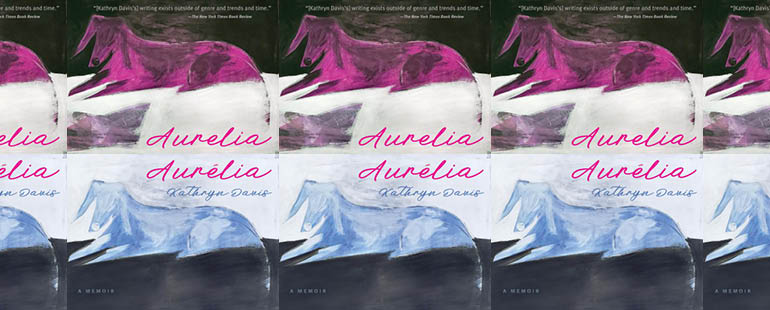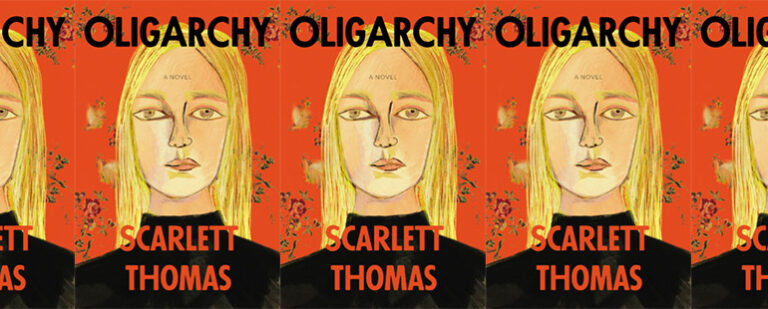Memory and Transformation in Aurelia, Aurélia

While my early years may have molded me, my twenties have been defining. Mortality, in particular, has come calling with a vengeance this decade: I lost my uncle and my three remaining grandparents; I experienced the deaths of students, including by suicide, and the tragic deaths of others in my community; I lost a close family friend; I faced the unexpected deaths of my husband’s parents; and I felt the impact of COVID-19 deaths from the world at large. “Loss grew as you did, without your consent; your losses mounted beside you like earthworm castings,” Annie Dillard writes in An American Childhood (1987). My twenties have felt like this, like moving through a pile of earthworm castings that weigh on me and shape me, leaving me with a continuous sense of becoming as I move from one point to the next.
“There are points in your life when you think you’re about to become whatever’s next,” novelist Kathryn Davis begins her memoir Aurelia, Aurélia, out tomorrow. For Davis, one of these points is her voyage during high school, aboard the Europe-bound Aurelia. At the beginning of the trip, she tries on a new persona, donning “a paisley scarf, peasant-style and, briefly, feign[ing] a Russian accent” as well as spending her time watching foreign films. Leaving home for the first time, in a very grand way, Davis sought the genuine and shed what didn’t suit her. This literal voyage becomes an anchor in the book, which traces her figurative voyage from childhood to widowhood, after her husband’s death from cancer in 2019. “To cross an ocean is of course a form of transition, a crossing,” Davis writes, “in this case from Woodale Road, locus of all things American and childish, to Europe, birthplace of the most interesting forms of sin.” On the Aurelia, she crosses the ocean and crosses from childishness to adulthood, or at least experiences a crucial moment on the way that changes her inherently.
My anchor moment came when my now-husband and I had been dating a few months; his estranged father died unexpectedly. We went to see his father’s body. I’d never seen a dead body before and was uncertain I wanted to, but I knew that this was my only chance to “meet” his father, and possibly my presence would be a needed source of support. Part of me also felt that choosing to see or not to see this body was choosing to be or not to be an adult, that seeing my husband’s dead parent would become a point of significant and irreversible change. The thought now seems dramatic—so many of these anchor moments have occurred in the ensuing eight years—but it felt heavily weighted then. In the end, I saw the body when I misunderstood the undertaker directing us around a corner: there wasn’t, as I’d expected, a door leading to the body, but simply a flimsy partition between the entryway and the area they’d set up for viewing. Though this wasn’t the decisive moment when I became an adult—a moment I’m not sure can exist—it was one in which something shifted inside me for good.
“There’s a kind of transit that occurs between the place in your mind where memory resides, as firmly planted as the house you grew up in, and the operative tool of thought, designed to transport you and your memory elsewhere, as if across an ocean on a boat,” Davis writes. Though the memories are securely stored, recalling them transports the rememberer, which creates a new experience. Again, the Aurelia serves as metaphor. Davis reflects on “[t]he excitement of having been—of being—that girl in the paisley scarf, waiting with almost impossible avidity for something, anything, to happen.” Her memory of the transition wrought by the voyage has a fixed beginning: that girl’s affections and the excited spirit. Then this fixedness yields something dynamic: “A mysterious transaction was about to take place: something rote was about to become something alive. This is how the associative moment occurs.” Like visiting my father-in-law’s body, Davis’s memory of the Aurelia entrenches itself in memory as something formative, a memory that begins with the static starting point then transitions into something alive, yielding something new, remembering becoming an experience in its own right.
In the midst of moving between memories of the Aurelia, her childhood, and her marriage, particularly her husband’s last years, Davis considers her transformation into a wife. “In the beginning he took me away from myself,” she writes. “I wanted other things—I was wildly ambitious—but those things required acts of will and were consequently subject to judgment, whereas the transformative power of marriage operated by magic.” Against her expectations and intentions, Davis’s husband transforms her by surprise, and marriage yokes her to something larger than the present. “When you marry someone you marry them all the way back to the beginning, past parents, grandparents, and great-grandparents, the whole ethnic pageant,” she writes, “all the way back to that first unspooling bolt of flesh and fat and tissue and beyond, a recognizable form receding into mere pattern and then schools of restless alien shapes shot with color, a wave, a shadow, the great shifting bottom currents.” You marry your partner’s history and their genetics and everything that comes before and after. The person you marry, like the body you get and the cancer laying waste to Davis’s husband’s body, is the result of chance. I consider my husband’s tapered fingers and widow’s peak, just like his father’s, and wonder what mysteries his cells hold. I pray they won’t stop his heart too young.
There’s some fear in how powerfully one person can enter your life and leave it, and incredulity at the nearly hidden way it can happen. “It began as a joke. My husband was dying. He had only so much time left—how much, we didn’t know,” Davis says. Whereas the memory of her time aboard the Aurelia carries with it excitement, her husband’s death from cancer disorients. “His spirits were generally good, and the shingles virus that made his last days miserable had yet to emerge from its hiding place deep in his body, meaning we could still share the same bed and spend our mornings side by side, drinking coffee and looking at the local paper, all ten pages of it.” In his sixties, her husband still appeared outwardly healthy and strong during much of his illness. He was too young to die, his death unimaginable. “When someone you have lived with for a very long time dies, memory stops working its regular way—it goes crazy,” Davis says. “It is no longer like remembering; it is, more often, like astral projection.” In the wake of her husband’s body’s betrayal, her own body cannot contain memories of their life together with the same crispness of those memories from her young adulthood. So transformed by grief and the radical shift in her life, the very nature of her memory is also transformed. She enters uncharted waters, which leads to her next phase as widow.
Long before widowhood, Davis began gaining an understanding of mortality. When she was seven, her beloved dachshund, Noodle, died. Initially, she was oblivious to the dog’s impending death, only feeling love for her cherished pet and unable to understand the ways his body was failing him. “My mother knew how this story was going to end, with the dog euthanized and the daughter inconsolable,” Davis writes, “and for this reason I understood that her distress involved me—as it so often did—and that I was not immune to what was going on.” Davis used context clues to make sense of the situation, and, like many children, noticed and reacted first to her mother’s reaction rather than the source of the pain. Through her mother’s grief, Davis was able to begin understanding and processing death. “Sentimentalizing death didn’t come until I connected death to myself,” she goes on to say. “I had loved Noodle with all my heart, but when I looked upon the face of that which I had loved, what I saw was not the animal.” After Noodle’s death, Davis’s view of her pet changed. She recognized that Noodle had transitioned from living to something other, something stiff and motionless, not the wiggling, adoring animal she’d loved with all her heart. When her grandmother died, Davis observed this moment of change again, as well as her impulse to care for a person while also acknowledging that the person is now a body. “You could tell, looking at a dead grandmother, that whatever had kept her alive was no longer there, just as you could tell, looking at the family dachshund, that whatever kept it alive was there in abundance,” she writes. The spark is gone, young Davis realizes; familiarity flees when a person is replaced with a stiff body. “When you are dead you are no longer inquisitive and soon you are hard as a rock,” she writes. The thing that makes you animate is extinguished as the body settles into rigor mortis. I can’t bear to think of the way the death of my beloved dog will transform me—her death seems unsurvivable—so I tell everyone that she has the same lifespan as me. “Owning a pet, you come face to face with death. You see the difference. The eyes like glass, like Xs,” Davis writes. “The head no longer tilted, inquisitive. The voice, silent.” I can’t imagine silence in place of my dog’s strange vocalizations. Just as the living transform into inanimate bodies, the death of those we love alters us deeply by forcing us to look at the beloved in a new way, an absence that can no longer feel but an absence we feel as sharply as a sore tooth.
When her husband dies, this shift in perspective becomes even more conspicuous because of their intimacy. “The day they came to get my husband’s body was the first day of July and it was hot,” she says. “You could look at the body and let them take it, two strangers, your husband’s body. It was wearing his favorite T-shirt and khaki pants and the beautiful many-colored socks my little sister knit for him. Then it went into a refrigeration unit. He couldn’t feel it.” First, Davis uses “my husband’s body,” then “you,” then “the body,” then simply “it.” Her husband is gone, though she’s dressed the body in her husband’s favorite shirt. Though she distinguishes between her husband and his body, she can’t lose his aliveness fully, slipping into “he” to note that he won’t be able to feel the chill of the refrigerator. As she washes his body before it’s taken away, she observes that “[t]he wish to inflict no harm is still there, elevated by the absence of response to something resembling desire.” Instinct compels one to care for a body as if the life hasn’t gone out of it. I think of my father-in-law on the steel table, a thin plastic sheet separating his body from it. My skin shivered at the thought of the cold metal, and I imagined him shivering too. The body’s appearance of wholeness tricks the viewer into not fully recognizing the body as something that can no longer feel. “You could look at the smooth outward shell of the body, almost like eggshell it was so smooth, and think nothing was happening.” The next time we would see the bodies, they’d be a box of ash, another form to reckon with entirely, but for now transitioning to the next phase demands we accept that these bodies are already cold and hard as a rock.
“When I was a sixteen-year-old girl riding the Aurelia to Europe, my husband was a nine-year-old boy with fifty-seven years left in which to do all the things he ended up doing in his life. The course of the transit is impossible to fathom, except via the remarkable apparatus of association,” Davis concludes, stitching together two lives and nearly six decades, merging the Aurelia’s voyage with the voyage of their lives. These years have inevitably shaped them, and the ship’s name becomes especially fitting not just for Davis the student, but for the trajectory of their lives. “Aurelia is the Latin translation of the Greek word for chrysalis, the gold-colored pupa of the butterfly, emblem of metamorphosis and hiddenness,” she explains, after depicting her own metamorphoses from pupa to butterfly across the decades. “Whatever I was pretending to be that week on the ship is exactly what I was,” she concludes, “the implausible outward trappings of the infinitely smaller thing inside.” One’s outward trappings convey something about an individual’s identity, though what one holds at their core is the thing that carries through. I like to think of Davis’s closing sentiment as an expression of optimism about the power of continuity but not stagnation. I think of rounding the corner, my father-in-law’s body there before me, a rigid thing indicating that I would marry my husband past this body and the heart that failed it, marry him all the way back to the beginning as I sailed into whatever point would come next.


